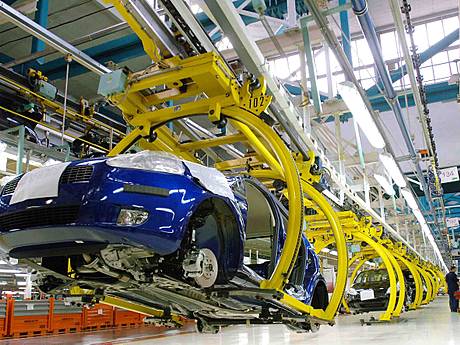
The automotive industry is among the sectors that have suffered from a severe impact of the economic crisis. In January-August 2015, production of motor vehicles fell by 83% year-over-year, from 24,850 to 4,218 vehicles. The output of passenger cars over the period under review decreased by 87% from 23,093 to 2,914 vehicles. If one analyzes the results of August alone, Ukraine manufactured 189 cars in August 2014, and it's zero this August. Everyone is aware of what condition Ukrainian automobile plants are now in, suffering from a lack of orders, including on the domestic market, declining production, problems with payments of wages, tough needs to lay people off, and other problems. Now the entire industry is on the verge of extinction, and this cannot be allowed – it must be saved. This is the position of the Anti-Crisis Council of NGOs and the Ukrainian League of Industrialists and Entrepreneurs (ULIE).
"The automotive industry is a sector that produces value-added commodities, fully using advanced technology and innovation. One job in this area provides 7-8 jobs for cooperative ties. All developed countries are doing their best to ensure the manufacture of own cars, namely Germany, the United States, Japan, Korea, China. In this case, they apply modern measures of state protectionism. Under the laws of economics, a state that does not support the industry and is moving towards the process of de-industrialization is gradually transformed into a raw materials appendage and supplier of low-cost labor for other developed countries," ULIE President Anatoliy Kinakh said.
In his view, a recent decision by the Interdepartmental Commission on International Trade to cancel special measures regarding the import of passenger cars to Ukraine regardless of the country of origin contradicts national economic interests and the objective to develop domestic industry. Special taxes on car imports were introduced in March 2013 for a period of three years. The decision to lift the taxes was made on September 30, 2015.
"The motivation given by the Interdepartmental Commission, which claims that the abolition of the special taxes on car imports is allegedly demanded by "Ukraine's national interests" causes particular resentment. The national interests do not require an increase in various imports on the domestic market, they require the development of own production and its maximum support. We expect the government will speed the adaptation of the economy to the implementation of European standards, decisions to be made by the Cabinet of Ministers and the National Bank of Ukraine (NBU) as for ensuring producers' access to loans (the NBU's current refinancing rate is fixed at 27%), favorable tax policy, the lobbying of the interests of Ukrainian exporters, who have to quickly reorient themselves from eastern to other markets," Kinakh said.
The Ukrautoprom Association, which sent a letter to the ULIE, said that the temporarily introduced special measures had had a positive effect on domestic production of passenger cars, they had helped increase the share of domestic companies in the domestic market from 11% to 32%. Yet, since 2014, under WTO rules, Ukraine annually liberalized import regulations. If in 2013 special tax on an imported car with engine volume being 1,000-1,500 cubic cm, was 6.46%, it was lowered to 4.31% in 2014 and further to 2.15% in 2015.
Observing such Ukrainian acquiescence, the Japanese government lodged a complaint that the Ukrainian side has no grounds for imposing special taxes, as car imports do not pose a serious threat to the Ukrainian automobile industry. The WTO dispute settlement institution supported Japan and recommended on June 26, 2015, that the taxes be lifted. "Instead of appealing against such recommendations, the Interdepartmental Commission on International Trade of Ukraine determined that it is in the national interests that the recommendations, which in fact safeguard other countries' interests, be implemented without objection. In our view, the government should make every effort to create the best conditions for domestic producers and boost their competitiveness. The measures that disregard domestic producers and support foreign ones damage the Ukrainian economy and demonstrate disrespect for our own industry. This is a serious violation of the national interests and it has nothing to do with efficient and professional public industrial and export-import policy. It is simply an attempt to "go with the flow" of strong international players," Kinakh said.
The ULIE says that the government's task is to create incentives for accelerated modernization of the national economy, promote the growth of competitiveness of Ukrainian products on the domestic and foreign markets as much as possible, and to demand immediate measures to prevent deeper recession in Ukraine's automotive industry.